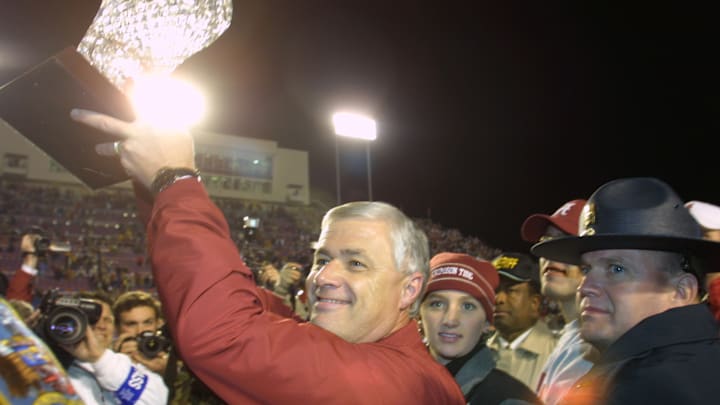Saturday night in Norman will be a rare matchup between Alabama football and the Oklahoma Sooners. Now that Oklahoma has made the move to the SEC, it's a matchup that will become more and more frequent.
This will just be the 7th meeting between the two programs. Only two of those games happened on campus sites. The first meeting between the two programs happened in the 1963 Orange Bowl, a 17-0 win for the Crimson Tide in a game remembered for LB Lee Roy Jordan's bowl-record 31 tackles.
The two programs played to a 24-all tie in the 1970 Bluebonnet Bowl. Alabama and Oklahoma met in the postseason two more times: the 2014 Sugar Bowl, a two-touchdown Sooners victory, and the 2018 Orange Bowl, which was a CFB semifinal game, a 45-34 Crimson Tide victory.
In between, Alabama and Oklahoma scheduled a home-and-home series and played each other in 2002 and 2003. The 2002 meeting was in Norman, Oklahoma, and until this weekend was the only time Alabama had played there.
Coming into the 2002 season, Oklahoma was one of the sports superpowers. The Sooners had won the national championship in 2000 and finished the 2001 season ranked No. 6 in both polls. Alabama was in the second and ultimately final year of Dennis Franchione's tenure as the team's head coach.
Alabama showed promise in 2001, rebounding from a 3-8 season in 2000. After starting the 2001 season 3-5, Alabama won its final four games to finish 7-5. That included a 31-7 upset win over Auburn in the Iron Bowl and an Independence Bowl victory for Iowa State.
Just when things seemed to be trending positively, Alabama was hit with NCAA sanctions that included a two-year bowl ban. The optimism for the 2002 team was lost in that they wouldn't be able to compete in the postseason.
It was week two of the 2002 season when Alabama traveled to Norman. Oklahoma was a heavy favorite coming in. The Sooners were 1-0 thanks to a 37-0 win over Tulsa. The Crimson Tide was also 1-0 but had a less-than-impressive 39-34 win over MTSU at Legion Field in the opener.
Alabama opened the scoring with a field goal following a surprise onside kick to open the game. But Oklahoma scored the next 23 points to take a 23-3 lead in what looked to be a Sooners rout.
But Alabama fought back. The Tide dominated the line-of-scrimmage and ultimately held a high-powered Oklahoma offense to negative rushing yards for the game. Keyed by a blocked punt for a touchdown, Alabama came all the way back and took a 24-23 lead. It added a field goal with just over three minutes to play to lead 27-23.
Oklahoma scored with just under two minutes to play thanks to a couple of big plays on inside shovel passes and took a 30-27 lead. Alabama QB Tyler Watts led the Tide around midfield as they looked to tie or win the game, but a strip sack and a fumble return touchdown ended Alabama's hopes and led to a 37-27 Sooners victory.
As it turned out, this was a matchup between two really good football teams. Despite being unable to play in the postseason, Alabama ultimately went 10-3. Had it not been for sanctions, the Crimson Tide would have won the SEC West and met Georgia in the SEC Championship Game.
Oklahoma ended up 12-2, won the Big 12, and beat Washington State in the Rose Bowl.
The Sooners continued being one of the top programs in the country moving forward. Two years later the Sooners played for a national championship against USC, albeit in a blowout loss.
For Alabama, Franchione abandoned his post at the end of the season to take his "dream job" in College Station at Texas A&M. After hiring Mike Price to replace Franchione, Alabama had to go through another coaching search after spring practice.
Former Tide QB Mike Shula was hired and Alabama began one of the darkest periods in the history of the program. Alabama won just 10 games over the next two seasons before a 10-2 season in 2005. That momentum couldn't be sustained and Alabama was back to winning just six games in 2006.
But the dark clouds broke and Mal Moore made the homerun hire of Nick Saban. The Tide emerged from the darkness and went on one of the best 17-year runs in the history of college football.
Saban is now gone, but Kalen DeBoer has Alabama ranked No. 7 in the country and right in the thick of the SEC and national championship races in his first year on the sidelines in Tuscaloosa.
As for Oklahoma, the Sooners are currently in year three under Brent Venables' guidance. The Sooners went just 6-7 in his first season before bouncing back and winning 10 games in year two. His third season, and Oklahoma's first in the SEC, has been rough. Oklahoma enters Saturday night's matchup with Alabama at just 5-5 and needs to beat either the Crimson Tide at home or LSU on the road next week to salvage bowl eligibility. You have to go all the way back to 1998 to find the last time the Sooners missed a bowl game, a streak of 25 consecutive, and the second-longest active streak in the country.
A lot has changed since that last meeting in Norman. Alabama is now the national power and Oklahoma is the program in flux trying to find itself. The result on the field this weekend isn't likely to change either program's trajectory. However, an Oklahoma win might restore some faith in Venables' vision and a loss for Alabama would knock the Tide out of the College Football Playoff.
